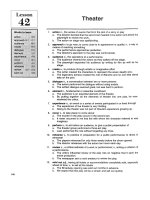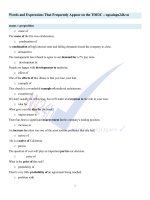1346 words their stories
Bạn đang xem bản rút gọn của tài liệu. Xem và tải ngay bản đầy đủ của tài liệu tại đây (172.65 KB, 3 trang )
The
, Hard Reality
English expressions that will leave you out in the cold
Cold weather has a great effect on how our minds and our bodies work. Maybe
that is why there are so many expressions that use the word cold.
For centuries, the body's blood has been linked closely with the emotions.
People who show no human emotions or feelings, for example, are said to be
cold-blooded. Cold-blooded people act in cruel ways. They may do brutal
things to others, and not by accident.
For example, a newspaper says the police are searching for a cold-blooded
killer. The killer murdered someone, not in self-defense, or because he was
reacting to anger or fear. He seemed to kill for no reason, and with no emotion,
as if taking someone's life meant nothing.
Cold can affect other parts of the body. For example, the feet. Heavy socks can
warm your feet, if your feet are really cold. But there is an expression -- to get
cold feet -- that has nothing to do with cold or your feet.
The expression means being afraid to do something you had decided to do. For
example, you agree to be president of an organization. But then you learn that
all the other officers have resigned. All the work of the organization will be
your responsibility. You are likely to get cold feet about being president when
you understand the situation.
Cold can also affect your shoulder.
You give someone the cold shoulder when you refuse to speak to them. You
treat them in a distant, cold way. The expression probably comes from the
physical act of turning your back toward someone, instead of speaking to him
face-to-face. You may give a cold shoulder to a friend who has not kept a
promise he made to you. Or, to someone who has lied about you to others.
~1~
A cold fish is not a fish. It is a person. But it is a person who is unfriendly,
unemotional and shows no love or warmth. A cold fish does not offer much of
himself to anyone.
Someone who is a cold fish could be cold-hearted. Now a cold-hearted person
is someone who has no sympathy. Several popular songs in recent years were
about cold-hearted men or cold-hearted women who, without feeling, broke the
hearts of their lovers.
Out in the cold is an expression often heard. It means not getting something
that everybody else got. A person might say that everybody but him got a pay
raise that he was left out in the cold. And it is not a pleasant place to be.
Now, choose the correct answer:
1. Steve killed them all for no reason. He is a ………..
a) cold-blooded killer
b) cold-blooded
c) cold fish
d) cold shoulder
2. Angel always breaks Sam’s heart. She is ……….
a) cold-hearted
b) cold fish
c) out in the cold
d) cold shoulder
3. I hate Bob. Once I saw him, I gave him the ………
a) out in the cold
b) cold weather
c) cold-hearted
d) cold shoulder
4. All the employees got a pay raise except me. So, I felt being ………..
~2~
a) cold-hearted
b) out in the cold
c) cold shoulder
d) cold-blooded
5. He never gives us a hand. He is a ……….
a)
cold fish
b)
cold-blooded
c) out in the cold
d) cold-hearted
Answers:
1. a) cold-blooded killer
2. a) cold hearted
3. d) cold shoulder
4. b) out in the cold
5. a) cold fish
~3~









